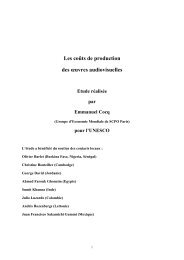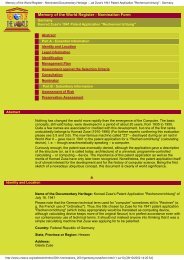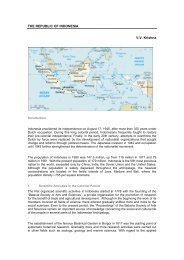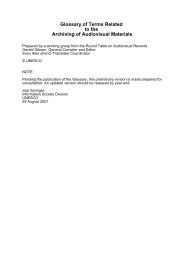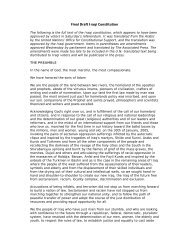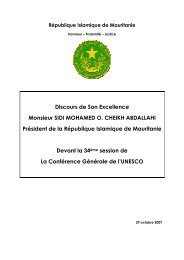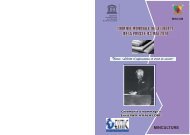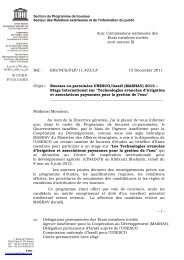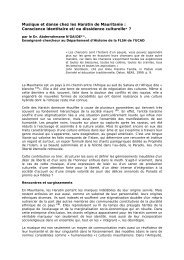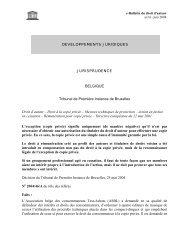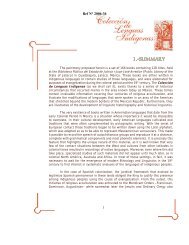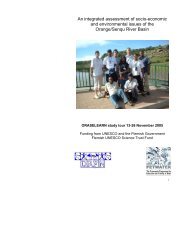Accepted Papers - 3.pdf - UNESCO
Accepted Papers - 3.pdf - UNESCO
Accepted Papers - 3.pdf - UNESCO
You also want an ePaper? Increase the reach of your titles
YUMPU automatically turns print PDFs into web optimized ePapers that Google loves.
National Seminar on Rainwater Harvesting and Water Management 11-12 Nov. 2006, Nagpur<br />
84. Water Resources Planning and Management in the face of<br />
Global Warming and Changing Climate<br />
* Pradeep K. Naik *P. K. Parchure *S. K. Bhatnagar<br />
Climate is changing<br />
Over the past century, India has built a vast<br />
and complex infrastructure to provide clean water<br />
for drinking and for industry, dispose of wastes,<br />
facilitate transportation, generate electricity, irrigate<br />
crops, and reduce the risks of floods and droughts.<br />
This infrastructure has brought tremendous<br />
benefits, albeit at a substantial economic and<br />
environmental cost. To the average citizen, the<br />
Nation’s dams, reservoirs, treatment plants, and<br />
pipelines are largely invisible and taken for granted.<br />
Yet they help insulate us from wet and dry years<br />
and moderate other aspects of our naturally variable<br />
climate. Indeed they have permitted us to almost<br />
forget about our complex dependence on climate.<br />
However, time has come we can no longer ignore<br />
these close connections. The scientific evidence that<br />
humans are changing the climate is increasingly<br />
compelling. Complex impacts affecting every sector<br />
of society, including especially the nation’s water<br />
resources now seem unavoidable.<br />
Don’t rely on uncertainties<br />
Most impact studies have been using<br />
information from global climate models that evaluate<br />
the effects of increases in greenhouse gas<br />
concentrations up to particular levels. Greater and<br />
greater impacts would be expected to result from<br />
ever increasing levels of climate change. Models<br />
have their limitations, and many uncertainties still<br />
remain. It is vital that uncertainties not be used to<br />
delay or avoid taking certain kinds of action now.<br />
Prudent planning requires that a strong national<br />
climate and water research program be maintained,<br />
that decisions about future water planning and<br />
management be flexible, and that the risks and<br />
benefits of climate change be incorporated into all<br />
long-term water planning. Policy makers must start<br />
considering climate change as a factor in all decisions<br />
about water investments and the operation of existing<br />
facilities and systems.<br />
Need for action<br />
A continued reliance solely on current<br />
engineering practice may lead us to make incorrect<br />
– and potentially dangerous or expensive –<br />
decisions. India has invested thousands of crores of<br />
rupees in dams, reservoirs and other concrete<br />
structures. These systems were designed and for<br />
the most part are operated assuming that future<br />
climatic and hydrologic conditions will look like past<br />
conditions. We now know this is no longer true.<br />
Accordingly, two of the most important coping<br />
strategies must be to try to understand what the<br />
consequences of climate change will be for water<br />
resources and to begin planning for and adapting to<br />
those changes.<br />
Coping and Adaptations – Public Policy<br />
1. Prudent planning requires that a strong<br />
national climate and water monitoring and research<br />
programme be maintained, that decisions about<br />
future water planning and management be flexible,<br />
and that expensive and irreversible actions be avoided<br />
in climate-sensitive areas.<br />
2. Better methods of planning under climate<br />
uncertainty should be developed and applied.<br />
3. Governments at all levels should re-evaluate<br />
legal, technical, and economic approaches for<br />
managing water resources in the light of potential<br />
climate changes. Improvements in the efficiency of<br />
* Scientist, Central Ground Water Board, Central Region, N.S. Building, Civil Lines, Nagpur – 440 001<br />
Ph.9423106185; Email. pradeep.naik@water.net.in<br />
486




